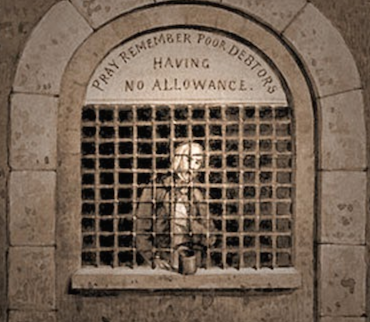
By Christopher Turque. Foxnews.com
Nikki Petree’s five-year odyssey through the bureaucracy, courts and jail began with the stroke of a pen.
The 40-year-old Pulaski County, Ark., resident was arrested in 2011 for bouncing a $29 check, which led to a series of missed payments, skipped court dates, new arrests and fines that have swelled to $2,700. Now battling hepatitis and pancreatitis, the minimum-wage worker is one of several plaintiffs who claim in a federal suit that the county – and others around the nation - runs what amounts to an unconstitutional “debtors’ prison.”
"The debtors' prison is rearing its head all across the country," said Kristen Clarke, director of the Lawyers' Committee for Civil Rights under the Law, a nonprofit based in Washington, D.C. which filed suit along with the ACLU of Arkansas.
The suit was filed last week in the U.S. District Court for the Eastern District of Arkansas and named as defendants the City of Sherwood, Pulaski County and Sherwood Municipal Judge Milas Hale III.
Clarke called the "hot check" division of the municipal court in Sherwood, Ark., near Little Rock, the "poster child" for a national trend toward "criminalizing poverty."
This summer, Petree did more than 3 weeks in jail. Her fellow plaintiffs include a pancreatic cancer patient jailed for 35 days this summer, Lee Robertson. Robertson says he hasn't been able to work since he got sick in 2009 --- and wrote $200 worth of bad checks. Fines have increased the amount he owes to more than $2,600.
In 1983, the U.S. Supreme Court ruled that a convict whose punishment is a fine can't be imprisoned if he or she proves an inability to pay the fine. The high court said a judge should reduce the fine, lengthen the payment plan, or require community service instead.
But the Arkansas lawsuit asserts that Hale doesn't follow the high court’s ruling.
According to the plaintiffs, Hale imposed fines without asking defendants if they could pay, and he's ignored them when they said they couldn't. The attorneys who filed the suit say defendants, before entering court, are told to sign forms they don't understand, waiving their right to legal counsel. According to the suit, the public defender in the courtroom normally remains silent, along with the prosecutor during the short hearings, which are closed to the public.
In a phone interview, Hale dismissed the "debtors' prison" accusation, and said only defendants who plan to plead guilty are required to sign those waivers. He declined to say more until he had met with his lawyers. Neither Sherwood nor Pulaski County officials have commented on the suit.
Arkansas ACLU Director Rita Sklar said the court in Sherwood is "notorious for just making money on the backs of the poor. The non-poor don't go to jail."
Hale’s court is not the only one accused of locking up people who can’t pay their fines.
Earlier in August, another suit, against the northern suburbs of St. Louis, accused 13 towns of targeting black motorists for traffic tickets, then holding those who didn't pay in what amounted to debtors' prisons.
In Houston, a disabled woman was reportedly jailed multiple times for unpaid traffic tickets --- even though she lived on $390 a month from Social Security and was primary caretaker for her grandchildren. In Austin, Texas, a single mother of seven was jailed while pregnant for unpaid traffic tickets. She lost her job while incarcerated; she was jailed again, reportedly for the same tickets, while unemployed.
Civil rights groups say local governments are turning minor offenses into revenue streams by multiplying the fines for misdemeanors.
Nikki Petree’s five-year odyssey through the bureaucracy, courts and jail began with the stroke of a pen.
The 40-year-old Pulaski County, Ark., resident was arrested in 2011 for bouncing a $29 check, which led to a series of missed payments, skipped court dates, new arrests and fines that have swelled to $2,700. Now battling hepatitis and pancreatitis, the minimum-wage worker is one of several plaintiffs who claim in a federal suit that the county – and others around the nation - runs what amounts to an unconstitutional “debtors’ prison.”
"The debtors' prison is rearing its head all across the country," said Kristen Clarke, director of the Lawyers' Committee for Civil Rights under the Law, a nonprofit based in Washington, D.C. which filed suit along with the ACLU of Arkansas.
The suit was filed last week in the U.S. District Court for the Eastern District of Arkansas and named as defendants the City of Sherwood, Pulaski County and Sherwood Municipal Judge Milas Hale III.
Clarke called the "hot check" division of the municipal court in Sherwood, Ark., near Little Rock, the "poster child" for a national trend toward "criminalizing poverty."
This summer, Petree did more than 3 weeks in jail. Her fellow plaintiffs include a pancreatic cancer patient jailed for 35 days this summer, Lee Robertson. Robertson says he hasn't been able to work since he got sick in 2009 --- and wrote $200 worth of bad checks. Fines have increased the amount he owes to more than $2,600.
In 1983, the U.S. Supreme Court ruled that a convict whose punishment is a fine can't be imprisoned if he or she proves an inability to pay the fine. The high court said a judge should reduce the fine, lengthen the payment plan, or require community service instead.
But the Arkansas lawsuit asserts that Hale doesn't follow the high court’s ruling.
According to the plaintiffs, Hale imposed fines without asking defendants if they could pay, and he's ignored them when they said they couldn't. The attorneys who filed the suit say defendants, before entering court, are told to sign forms they don't understand, waiving their right to legal counsel. According to the suit, the public defender in the courtroom normally remains silent, along with the prosecutor during the short hearings, which are closed to the public.
In a phone interview, Hale dismissed the "debtors' prison" accusation, and said only defendants who plan to plead guilty are required to sign those waivers. He declined to say more until he had met with his lawyers. Neither Sherwood nor Pulaski County officials have commented on the suit.
Arkansas ACLU Director Rita Sklar said the court in Sherwood is "notorious for just making money on the backs of the poor. The non-poor don't go to jail."
Hale’s court is not the only one accused of locking up people who can’t pay their fines.
Earlier in August, another suit, against the northern suburbs of St. Louis, accused 13 towns of targeting black motorists for traffic tickets, then holding those who didn't pay in what amounted to debtors' prisons.
In Houston, a disabled woman was reportedly jailed multiple times for unpaid traffic tickets --- even though she lived on $390 a month from Social Security and was primary caretaker for her grandchildren. In Austin, Texas, a single mother of seven was jailed while pregnant for unpaid traffic tickets. She lost her job while incarcerated; she was jailed again, reportedly for the same tickets, while unemployed.
Civil rights groups say local governments are turning minor offenses into revenue streams by multiplying the fines for misdemeanors.

 Like us on Facebook
Like us on Facebook Follow us on Twitter
Follow us on Twitter